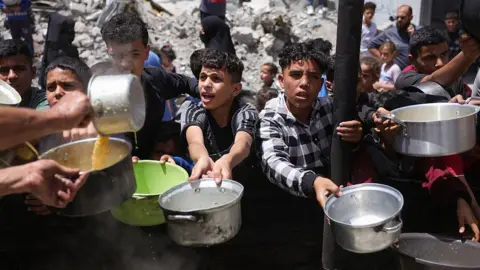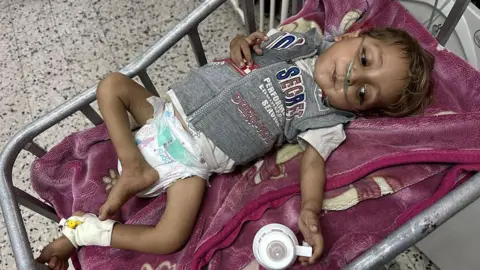Head of controversial Israel-backed Gaza aid group resigns
 Getty Images
Getty ImagesThe head of an organisation set up to distribute aid in Gaza as part of a controversial Israel-backed plan has resigned, saying it could not work in a way that adhered to "humanitarian principles".
Jake Wood quit the Gaza Humanitarian Foundation (GHF) late on Sunday, saying it would not be able to fulfil the principles of "humanity, neutrality, impartiality, and independence".
The plan, also backed by the US, will have private contractors delivering aid via Israel-designated distribution sites. It was criticised by the UN, which says it will not participate.
The GHF said on Monday night that it had delivered its first aid shipments to Gaza and distribution to the Gazan people was under way.
Under the GHF plan, Palestinians would be expected to collect boxes weighing up to 20kg (44lbs) containing food and basic hygiene items from four distribution points in southern Gaza.
It is unclear how the weak or injured would be able to collect the aid.
Israel insists the plan is needed to stop Hamas stealing aid, which the armed group denies doing.
UN aid chief Tom Fletcher said it would force further displacement, restrict aid to only one part of Gaza and make "starvation a bargaining chip."
In his resignation statement, Wood, a former US marine, said: "Two months ago, I was approached about leading GHF's efforts because of my experience in humanitarian operations.
"Like many others around the world, I was horrified and heartbroken at the hunger crisis in Gaza and, as a humanitarian leader, I was compelled to do whatever I could to help alleviate the suffering."
He said he was "proud of the work I oversaw, including developing a pragmatic plan that could feed hungry people, address security concerns about diversion, and complement the work of longstanding NGOs in Gaza."
But, he said, it had become "clear that it is not possible to implement this plan while also strictly adhering to the humanitarian principles of humanity, neutrality, impartiality, and independence, which I will not abandon."
In response, the GHF said it would "not be deterred" by Wood's resignation and would begin delivering aid on Monday, with an aim to reach one million Palestinians by the end of the week.
The group said that critics "who benefit from the status quo have been more focused on tearing this apart than on getting aid in, afraid that new, creative solutions to intractable problems might actually succeed."
It added: "Our trucks are loaded and ready to go."
An Israeli official said "the goal of this new approach is to eliminate the Gazan population's dependence on Hamas".
Israeli media reported that the first of four distribution centres would be opened by GHF on Monday morning.
Last week, Israel eased an 11-week blockade on all food, fuel, medicine and other supplies entering Gaza, with the first aid trucks reaching civilians in recent days - but the UN has said it's a "drop in the ocean of what's needed".
It says 57 children died from malnutrition during Israel's blockade - while the World Food Programme (WFP) warned last week that Gaza's entire population was "on the brink of starvation".
 Getty Images
Getty ImagesJan Egeland, Secretary General of the Norwegian Refugee Council, told the BBC's Today Programme that the GHF is "militarised, privatised, politicised" and "not in conformity with neutrality".
"The people behind it are military – they are ex-CIA and ex-military people… Let's go back to the system that worked" he said.
The GHF has also come under intense scrutiny around its funding, origins and backing.
On Monday evening, it announced John Acree, a former senior manager at USAID, had been named interim executive director.
Over the weekend, an investigation by The New York Times suggested the group may have been conceived in Israel by a group of Israeli officials and military officers and their partners in the Israeli business sector.
Responding to the plan earlier this month, UN children's fund spokesperson Jonathan Crickx said: "How is a mother of four children, who has lost her husband, going to carry 20kg back to her makeshift tent, sometimes several kilometres away?"
"The most vulnerable people, including the elderly, people with disabilities, the sick and wounded, and orphans, will face huge challenges to access aid."
Israel launched a military campaign in Gaza in response to Hamas's cross-border attack on 7 October 2023, in which about 1,200 people were killed and 251 others were taken hostage.
At least 53,939 people, including at least 16,500 children, have been killed in Gaza since then, according to the territory's Hamas-run health ministry.
